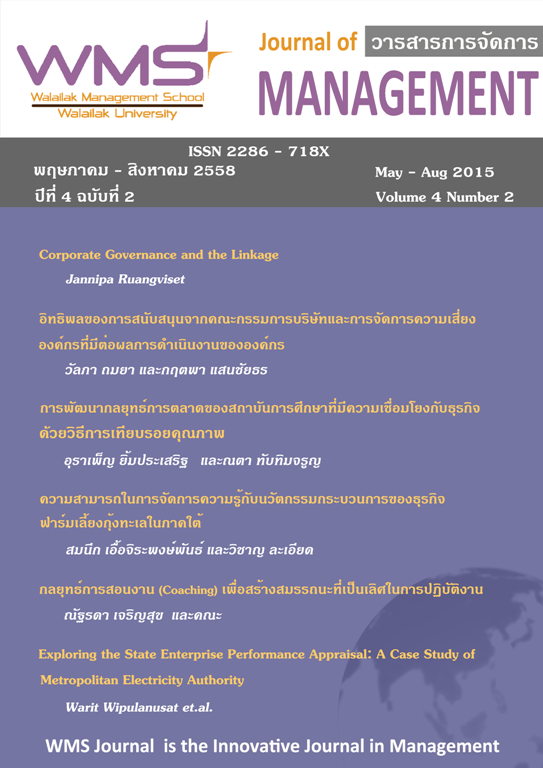Knowledge Management Capability and Process Innovation of Marine Shrimp Farm in Southern Thailand
Main Article Content
Abstract
The purpose of this study was to focus on organization factors, resource-based perspective on knowledge management, innovative capabilities, the difference of organization factors on processes innovation, and the relationship between knowledge management capabilities and processes innovation concerning with the marine shrimp farm in the south of Thailand.
The results showed that. Marine shrimp farm in the southern part have mostly maintained in 100-200 rai. The most farm culturing on whiteleg shrimps while the production sizes of shrimp are 40-100 pieces per kg. The farms have 21-50 employees and operated more than 15 years. Most enterprising businesses have had a single owner that had no research and development.
The aspects of resource-based perspective on knowledge management capability include cultures, structures, technologies and human resources perspective regarding to marine shrimp farm in the south and the process innovation of marine shrimp farm. The results showed that the resource-based perspective on knowledge management capability is at high. The capability on cultures and human resources as well as organization structures has been manifested at high levels. While the sides of technologies are intermediate, the capability of process innovation is at high.
Organization factors (including size of the business, a variety of products, a number of employees, time in business, a model of business, and research and development associated with the capability of Processes Innovation) for marine
shrimp farm and capabilities of process innovation were not significantly different (p<005).
Hypothesis tests were found that knowledge management capabilities on the view of natural resources and processes innovation for marine shrimp farm were positively correlated with high levels. Interestingly, knowledge management capabilities on human resources showed the high relationship with processes innovation only one side. While knowledge management capabilities associated with cultures resources, structures, and technologies were concerned with process Innovation at intermediate level.Article Details
References
กรกมล หัตถพลาเมธ. 2553. การพัฒนาโมเดลความสัมพันธ์ของปัจจัยเชิงการมุ่งเน้น ความสามารถทางนวัตกรรม และผลการดำเนินงาน ในธุรกิจซอฟต์แวร์ไทยที่ได้รับการส่งเสริมการลงทุนจากสำนักงาน คณะกรรมการส่งเสริมการลงทุน (BOI). (วิทยานิพนธ์ปริญญามหาบัณฑิต, มหาวิทยาลัยวลัยลักษณ์).
กระทรวงเกษตรและสหกรณ์ กรมประมง ศูนย์สารสนเทศ. 2554. การเพาะเลี้ยงชายฝั่ง Coastal Aquaculture Fishery. สถิติการประมงแห่งประเทศไทย พ.ศ. 2552. 2554 (9). 39. สืบค้นจาก http://www.fisheries.go.th/it-stat/yearbook/data_2552/Yearbook/ Yearbook2009.pdf
กฤศกร จิรภานุเมศ. 2553. ผลของการมุ่งเน้นความเป็นผู้ประกอบการ กลยุทธ์ที่มีต่อความสามารถทางนวัตกรรม และผลการดำเนินงาน การศึกษาเชิงประจักษ์ของบริษัทที่จดทะเบียนในตลาดหลักทรัพย์ เอ็ม เอ ไอ. (วิทยานิพนธ์ปริญญามหาบัณฑิต, มหาวิทยาลัยวลัยลักษณ์).
กีรติ ยศยิ่งยง. 2552. องค์กรแห่งนวัตกรรม: แนวคิดและกระบวนการ. กรุงเทพฯ: จุฬาลงกรณ์มหาวิทยาลัย.
แคทซ์ ราล์ฟ. 2549. การบริหารจัดการนวัตกรรม. แปลจาก Managing Creativity andInnovation. แปลโดย ณัฐยา สินตระการผล. กรุงเทพฯ: เอกซ์เปอร์เน็ท.
จาตุรน ชุติธรพงษ์. 2553. การจัดการความรู้เพื่อสร้างสรรค์นวัตกรรมของบุคลากรสายปฏิบัติการวิชาชีพของมหาวิทยาลัยในกำกับของรัฐ. (วิทยานิพนธ์มหาบัณฑิต, มหาวิทยาลัยวลัยลักษณ์).
จิรประภา อัครบวร จารุวรรณ ยอดระฆัง และ อนุชาติ เจริญวงศ์มิตร. 2552. การจัดการความรู้ (พิมพ์ครั้งที่3). กรุงเทพฯ: สำนักงานคณะกรรมการพัฒนาระบบราชการ.
ชะลอ ลิ้มสุวรรณ และ นิติ ชูเชิด. 2552. แนวทางการเลี้ยงกุ้งโดยใช้หลักปรัชญาเศรษฐกิจพอเพียง. กรุงเทพฯ: สถาบันวิจัยและพัฒนาแห่งมหาวิทยาลัยเกษตรศาสตร์ สืบค้นจาก http://www.rdi.ku.ac .th/kasetresearch52/01-celebrate/chalor/ celebrate_00.html
ชัชวาลย์ วงษ์ประเสริฐ. 2548. การจัดการความรู้ในองค์กรธุรกิจ. กรุงเทพฯ: เอ็กซเปอร์เน็ท.
ดนัย เทียนพุฒ. 2550. จุดระเบิดความคิดธุรกิจ “ธุรกิจ: Innovation or Die”. กรุงเทพฯ: คณะบุคคลโครงการ Human Capital.
ดนัย เทียนพุฒ. 2554. ไอเดีย & นวัตกรรมในธุรกิจ(2). กรุงเทพฯ: โครงการ Human Capital.
ทิพวรรณ หล่อสุวรรณ. 2550. เครื่องมือการจัดการ= Management Tools. กรุงเทพฯ: สถาบันบัณฑิตพัฒนบริหารศาสตร์.
นันทรัตน์ ศรีสนุ่นวิเชียร. 2548. ความสัมพันธ์ระหว่างการจัดการความรู้ ภาวะผู้นำการเปลี่ยนแปลง และประสิทธ์ผลของกลุ่มงานการพยาบาล โรงพยาบาลสังกัดกรมการแพทย์ กระทรวงสาธารณสุข เขตกรุงเทพมหานคร. (วิทยานิพนธ์, จุฬาลงกรณ์มหาวิทยาลัย).
น้ำทิพย์ วิภาวิน. 2547. การจัดการความรู้กับคลังความรู้. กรุงเทพฯ: เอสอาร์ พริ้นติ้งแมสโปรดักส์.
บดินทร์ วิจารณ์. 2547. การจัดการความรู้ สู่...ปัญญาปฏิบัติ. กรุงเทพฯ: เอกซเปอร์เน็ท.
บุญดี บุญญากิจ และ ณัชมน พรกาญจนานันท์. 2550. ตรวจประเมินความรู้...สู่ปฏิบัติ. กรุงเทพฯ: สถาบันเพิ่มผลิตแห่งชาติ.
บุญดี บุญญากิจ นงลักษณ์ ประสบสุขโชคชัย ดิสพงศ์ พรชนกนาถ และ ปรียาวรรณ กรรณล้วน. 2547. การจัดการความรู้ จากทฤษฎีสู่ปฏิบัติ. กรุงเทพฯ: สถาบันเพิ่มผลผลิตแห่งชาติ.
บูรชัย ศิริมหาสาคร. 2550. จัดการความรู้สู่ความเป็นเลิศ = Knowledge management to excellence organization : IDEA can do = มุขบริหารสุ่การเป็นผู้นำ เล่ม 3. กรุงเทพฯ: แสงดาว.
ประคอง กรรณสูต. 2542. สถิติเพื่อการวิจัยทางพฤติกรรมศาสตร์. กรุงเทพฯ: จุฬาลงกรณ์มหาวิทยาลัย.
ปรีดา ยังสุขสถาพร. 2549. I5 พลวัตนวัตกรรม. กรุงเทพฯ: กระทรวงวิทยาศาสตร์และเทคโนโลยี.
พรธิดา วิเชียรปัญญา. 2547. การจัดการความรู้: พื้นฐานและการประยุกต์ใช้. กรุงเทพฯ: เอ็กซเปอร์เน็ท.
มหาวิทยาลัยเกษตรศาสตร์. 2549. คณะประมง มก. ชูงานวิจัยสยบปัญหากุ้งส่งออก. สืบค้นจาก http://pr.ku.ac.th/clipnews/html/09%20September%2049/18sep49/krungtep10.htm
ยุทธนา แซ่เตียว. 2548. การวัด การวิเคราะห์และการจัดการความรู้: สร้างองค์กรอัจฉริยะ. กรุงเทพฯ: สถาบันเพิ่มผลผลิตแห่งชาติ.
วรภัทร์ ภู่เจริญ. 2550. การบริหารนวัตกรรมอย่างยั่งยืนและพอเพียง. กรุงเทพฯ: อริยชน.
วิจารณ์ พานิช. 2551. การจัดการความรู้ : ฉบับนักปฏิบัติ (พิมพ์ครั้งที่ 4). กรุงเทพฯ: สถาบันส่งเสริมการจัดการความรู้เพื่อสังคม.
วุฒิพงษ์ ภักดีเหลา. 2554. การศึกษาคุณลักษณะขององค์การนวัตกรรม: กรณีศึกษาองค์การที่ได้รับรางวัลนวัตกรรม. (วิทยานิพนธ์มหาบัณฑิตย์, สถาบันบัณฑิตพัฒนบริหารศาสตร์).
สการ์ซินสกี้ ปีเตอร์ และ กิ๊บสัน โรแวน. 2553. การสร้างนวัตกรรมให้เป็น Core Competency. แปลจาก Innovation to the Core. แปลโดย ณัฐยา สินตระการผล. กรุงเทพฯ: เอกซ์เปอร์เน็ท.
สมจินตนา คุ้มภัย. 2553. การเปรียบเทียบวัฒนธรรมองค์การที่มีอิทธิพลต่อประสิทธิผลองค์การ:กรณีศึกษา รัฐวิสาหกิจในประเทศไทย. (วิทยานิพนธ์ปริญญาดุษฎีบัณฑิต, สถาบันบัณฑิตพัฒนบริหารศาสตร์).
สมนึก เอื้อจิระพงษ์พันธ์. 2553. การจัดการความรู้กับนวัตกรรม. นครศรีธรรมราช: มหาวิทยาลัยวลัยลักษณ์.
สมนึก เอื้อจิระพงษ์พันธ์ พักตร์ผจง วัฒนสินธุ์ อัจฉรา จันทร์ฉาย และประกอบ คุปรัตน์. 2554. ความสามารถในการจัดการความรู้กับความสามารถทางนวัตกรรมของผู้ประกอบการที่มีนวัตกรรมในประเทศไทย. (วิทยานิพนธ์ปริญญาดุษฎีบัณฑิต, จุฬาลงกรณ์มหาวิทยาลัย).
สำนักงานนวัตกรรมแห่งชาติ. 2550. นโยบายวัฒนธรรม: การศึกษาขีดความสามารถด้านนวัตกรรมของประเทศไทยประจำปี 2550. สืบค้นจาก http://www.nia.or.th/index.php?section= aboutus&page=strategy_policy
สุพิชญา รักษ์ทอง. 2554. การจัดการความรู้ของพนักงาน บริษัทศรีสุบรรณฟาร์ม จำกัด จังหวัดสุราษฎร์ธานี. (การศึกษาอิสระมหาบัณฑิต, มหาวิทยาลัยวลัยลักษณ์).
อันดรูว์, ฮาร์กาดอน. 2549. ผ่าทางตัน: สรรค์สร้างนวัตกรรม. แปลโดย สืบสกุล สุวรรณจินดา และเตือนตา สุวรรณจินดา. กรุงเทพฯ: ขวัญข้าว'๙๔.
เอกอนันต์ ยุวเบญจพล. 2553. ทางออกสำหรับการเลี้ยงกุ้งปี 2553. สืบค้นจาก http:// shrimpcenter.com/shrimp00199.html
An Australian Government Initiative. 2007. 2006-07 The Australian Government’sInnovation Report. [Electronic Version]. Commonwealth of Australia.
Chuang, S. H. 2004. A resource-Based perspective on knowledge management capability and competitive advantage: an empirical investigation. Expert Systems withApplications, 27, 459-465.
Department of Innovation Industry, Science and Research. 2011. Australian Innovation System Report 2011. [Annual Report]. Retrieved from http://www.innovation.gov.au/Innovation/Policy/AustralianInnovationSystemReport/AISR2011/wp-content/uploads/2011/07/Australian-Innovation-System-Report-2011.pdf
Gold, A. H., Malhotra, A. and Segars, A. H. 2001. Knowledge Management: An organization capability perspective. Journal of Management information systems, 18(1), 185-214.
Hambrey, J., & Lin, C. K., 2012. Shrimp Culture In Thailand. Retrieved from http://aquafind.com/articles/shmcul.php
Hansen, M.T., Nohria, N. & Tierney, T. 1999. What’s your strategy for managing knowledge?. Harvard business review. March-April, 106-116.
Kim, J. Y., Wong, V. & Eng, T. Y. 2005. Product variety strategy for improving new product development proficiencies. Technovation, 2005 (25), 1001-1015. doi: 10.1016/j.technovation.2004.02.011
Ruggles, R. 1998. The State of the Notion; Knowledge Management in Practice. Califonia management review, 40(3), 80-89.
Schermerhorn, J. R. 2011. Introduction to management. Hoboken, N.J.: Wiley.
Yang, C. & Chen, L. 2007. Can organizational knowledge capabilities affect Knowledge sharing behavior?. Journal of Information Science, 33(1), 95-109.
Yin, X. and Zuscovitch, E. 1998. Is firm size conducive to R&D choice? A strategic analysis of product and process Innovations. Journal of Economic Behavior & Organization. 35, 243-262.

